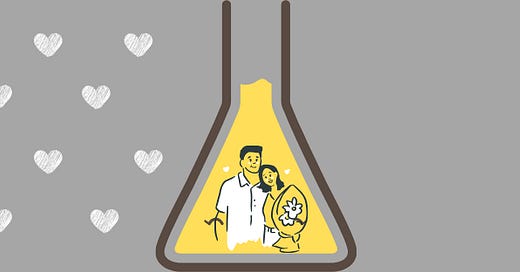Love and Liquidity
This week’s newsletter is inspired by my long-time hypothesis - whether it’s dating or marriage, the one thing that stands between you and your love is liquidity. Through personal anecdotes, I’ll try to explain what I mean.
Some of you may already know this, but I spend a couple of hours every morning browsing through various matrimonial websites as I assist people in their spouse hunt. My job would be a million times more interesting if these sites weren’t filled with so many boring sounding people. But that’s really why people hire me - they don’t have the bandwidth or patience to cut through the noise. I help find the “least wrong ones” so people can pick “the one” who is most right themselves.
I don’t know if it’s because I’ve done this for a while now or if it’s easy to tell who’s wrong for someone, the elimination process isn’t very challenging. Even with the worst matching sites, it’s not impossible to find people who are between 60-90% right for someone. Where it gets super tricky is in finding a 90-100% match, assuming a 100% match exists because most of the time, they aren’t even in the market.
So, the perpetual question lingers … where are all the cool people?
There are no cool people anymore. By the time you’ve learnt enough about someone, they cease to be cool. It’s sort of like the Heisenberg’s uncertainty principle. That’s why, people from the previous generation wouldn’t encourage couples meeting much before they were wedded saying charm will go off.
Back in the 90s, there was a simple and standard definition for coolness (something like boy with MS in US or homely girl) and your parents helped you cut through the noise by handing you at best two options. But today, things are different:
We don’t live in a world that’s so black and white. The definition of cool has exploded to include anything from paid subscribers to your newsletter to just hanging out in Starbucks with a Mac. So, the usual filters don’t work.
Parents don’t help you cut through the noise anymore. Whether it’s because we don’t listen to them anymore or that they don’t get us, I don’t know. Most parents prefer spending time deleting WhatsApp messages (don’t ask me why) over finding partners for their single wards.
Actually, let me just illustrate this with a stack of our needs and show you how that’s evolved over the last 20-25 years:
When we had one or two filters, it was easier to find people who met our needs and it was more likely that we satisfied their needs too. The chance of finding someone who meets our ever evolving multi-layered needs today is quite low, and the chance of them liking us back is infinitesimal because after all this is a matching market.
Say you had 2 filters, you could pick 10 people out of a 1000. But when you have 10 filters, you’re left with 0.01 of a match. Have you ever wondered what it would take, infrastructure wise, to be able to make the 0.01 boy into 1 match? The app would need to have 100 times the users and that too at the same time as you. The more filters you have the more illiquid the market becomes, and the cost of introducing liquidity in such a market is very very very high.
But you already knew this, which is why you try to maximise your odds by being not on one but ten apps at the same time in the hope that you will find that one person. That’s still not good enough, is it? But you don’t learn this. The illusion of infinite choice means that the feedback from the market is muddled. When you had a parent or a priest in the middle, they’d slap you in the face if you told them you were sapiosexual and wanted an ambivert.
Now you might say that you are in a better place having gotten rid of the dream-crushing inefficient middle men/women, but are you, really?
Sneak Peak into What I’m reading:
A long petal of the sea by Isabelle Allende - In the backdrop of the Spanish Civil war in 1930s, this book follows an unusual love story of a Catalan couple who get married not out of love, but in order to be able to emigrate to South America.It’s not until very late into their marriage do they realise how deeply love binds their relationship. Strangely it’s like the story of any loving arranged marriage couple in India.
Grit by Angela Duckworth - After a long fiction spree, I’ve picked up non-fiction. I bet I’ll regret it, but this is a book that I’ve been reading for a long time now, and so it’s either now or never. Ironically, this book’s needed more grit than I’d expected. Nevertheless, I hope to finish it before I write to you again. Wish me luck.




